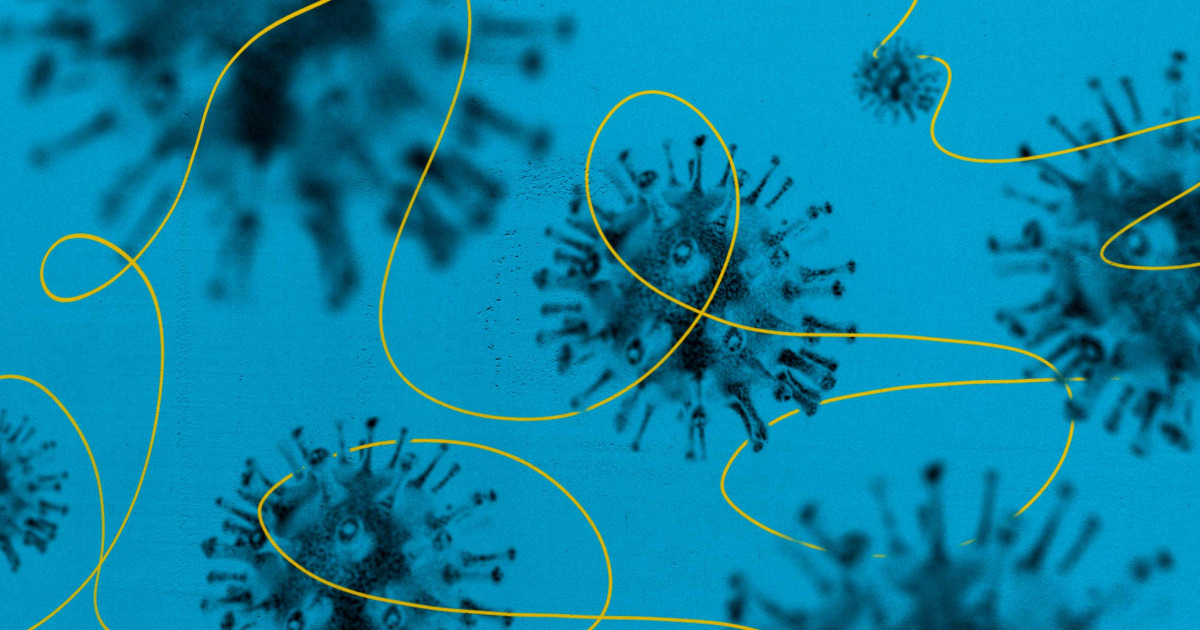
The rapid spread of the omicron variant has left many vaccinated people feeling confused about which activities are safe as the U.S. heads into the third year of the Covid-19 crisis.
Omicron appears to be far more transmissible than prior versions of the virus and better able to evade immune protection from vaccines or prior infection, though it seems to cause less severe illness.
The average number of new cases in the U.S. topped 590,000 on Wednesday, with an average of 1,349 deaths. More than 110,000 Covid patients are hospitalized. For many people, those stark statistics raise familiar questions about whether to curtail social gatherings, travel and other activities.
NBC News asked four public health experts about their own personal behavior and risk calculus during this chapter of the pandemic. All of them advised vaccinated people to remain vigilant and conscientious — and not to return fully to pre-pandemic life — but there was no firm consensus around some activities like air travel.
Michael Osterholm, director of the Center for Infectious Disease Research and Policy at the University of Minnesota, struck the most cautious note, saying he has avoided travel and restaurant dining since March 2020.
But others said they have returned to some pre-pandemic rituals while taking strict precautions. What follows are their answers to five common questions that might be on your mind.
What kind of mask do you wear right now?
The most simple answer: N95, KN95, KF94 or a similar high-quality face covering.
Dr. Kavita Patel, a primary care physician in Washington, D.C., and a scholar at the Brookings Institution, said people who can afford to upgrade their masks should trash the cloth ones that were ubiquitous during earlier Covid waves. Higher-quality masks like N95s are more effective at blocking viral particles.
“I have thrown out my cloth masks,” Patel, who is also an NBC News medical contributor and columnist for MSNBC, said. “I’ve saved a couple of my children’s favorite cloth masks, though, but I have them going to school wearing KN95s.”
But if a cloth face covering is all you can access or afford, that’s probably better than nothing.
Is it OK to travel by plane?
The Centers for Disease Control and Prevention recommends that domestic travelers delay any trips until they are fully vaccinated and that everyone wear a mask at the airport and on planes.
The experts who spoke to NBC News expressed differing levels of comfort with air travel at this stage of the pandemic. Osterholm said he has yet to resume flying and has been on a plane just once since March 2020, whereas “normally I’m a 150,000-mile-a-year flyer.”
“Anything I can avoid, I will,” Osterholm said. “It’s an easy one for me in the sense that I am able to accomplish what I need to accomplish without having to get on a plane.” He similarly avoids trains and buses.
Other experts were more open to air travel. Patel said she went to Puerto Rico last month on vacation with her husband and two children, who are all vaccinated. She wore an N95 on the flight — and did not remove it once — and researched the Covid situation in Puerto Rico before leaving, as the CDC recommends. (Patel said she planned the trip before cases rose dramatically on the island.)
Dr. Celine Gounder, an infectious disease specialist at NYU Langone Health in New York City, said she and her husband flew to Kansas City, Missouri, around Christmastime.
They, too, wore N95 masks while traveling, and they did not eat or drink so as not to remove their face coverings. While in Kansas City, they did rapid tests every morning.
“It was a Covid-free Christmas,” Gounder said.
Dr. Leana Wen, an emergency physician and former health commissioner for Baltimore, said she would feel “quite confident” on a plane (in a mask) if she only had to worry about herself and her husband. But they have two kids under 5, who are not eligible for vaccines, including a child under 2 who is unable to wear a face covering, so she is avoiding air travel.
Do you eat at restaurants?
Osterholm errs on the side of caution here, too: He has not visited a commercial eatery since March 2020. He has only gone into grocery stores a handful of times (masked, of course) and mostly orders food online.
Gounder, meanwhile, has not dined indoors since Covid-19 reached the U.S., but she and her husband, who live in New York City, occasionally eat outside in the makeshift restaurant structures that now line many streets.
She continues to avoid movie theaters, Broadway shows and gyms, however, and said it “could be a while yet” before she feels comfortable returning to those establishments.
Is it safe to send your child to school?
The debate over school closures is once again roiling the country. The public health consensus is that it is safe to send vaccinated children into classrooms as long as school administrators and teachers are conscientious about masks and other mitigation efforts.
But for parents of kids under 5, the risk assessment can be trickier.
Wen said her 4-year-old son is going into preschool. “We need to accept that there is risk in everything we do,” she said.
“Our goal at this point cannot be to avoid Covid altogether. That would be extraordinarily difficult,” Wen added. “The price to pay to avoid getting sick is extremely high. We are not willing to keep our child out of school in order to achieve zero Covid.”
She said her son’s preschool has many precautions in place and tries to keep kids outside when possible, even in the cold.
Patel said she would advise parents of young children to make sure their kids’ day care, preschool or kindergarten requires masks and regularly screens the little ones for symptoms.
Gounder, though, said parents of young kids may want to consider keeping them at home for now, “if you can afford it.”
“But if both parents are working outside the home or that kind of care is too costly, that may not be an option for everybody, especially lower-income families,” she added.
How should we all handle Covid isolation?
The most recent source of confusion about Covid protocols came last week, when the CDC shortened the recommended time people should isolate after testing positive from 10 days to five — if their case is asymptomatic or symptoms are resolving. The agency did not ask people to test negative before re-emerging.
The announcement led to an outcry from some health experts, who said the shorter window could allow more opportunities for the virus to spread. The CDC clarified its guidance Tuesday, saying people can use rapid antigen tests around the fifth day of their isolation if they want to and have access to them, and they should wear masks for another five days.
Gounder said the guidance was “probably the most confusing I’ve seen come out so far.”
She added that it’d be “preferable” for people to get tested before leaving isolation, since some can remain infectious for up to eight days after the initial five-day period, “and we don’t always know who that’s going to be.”
“If that person is religiously wearing a high-quality mask, the probability that they would infect somebody else is probably low,” Gounder said. “But I know many people do not wear masks or wear them incorrectly or take them off during the day.”
In the face of omicron, some people are also beginning to wonder whether getting sick is inevitable and, if so, whether it would be better for an infected person not to isolate themselves from other members of their household. Patel shot down that idea.
“I’m old enough to remember when we took that approach with chicken pox,” Patel said. “But that’s not a great idea with Covid.”
“I’ve been discouraging people from going, ‘Hey, let’s all get Covid at the same time,’ because we’re seeing variable clinical presentations,” she added. “We’re seeing cases where kids get it and the adults don’t, or vice versa. There’s no reason to assume everyone will get it.”
Plus, she said, omicron could hit some family members harder than others, and everyone should do their part to avoid putting more strain on overwhelmed physicians and hospitals.
“It’s not worth taking that chance, if you can avoid it,” she said.
Source: | This article originally belongs to Nbcnews.com









